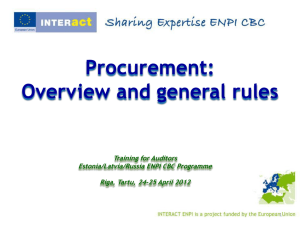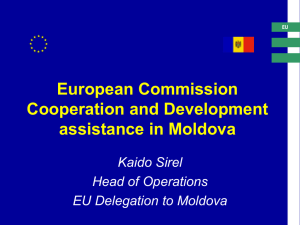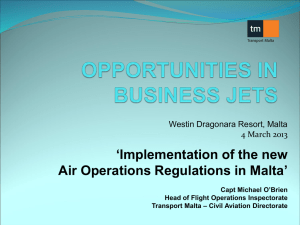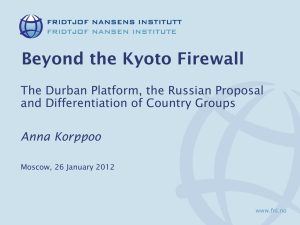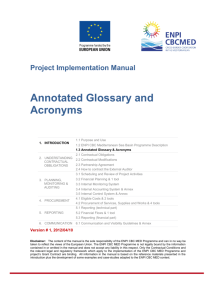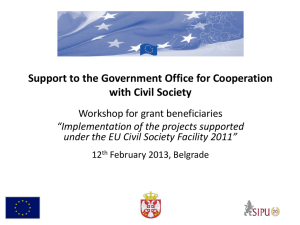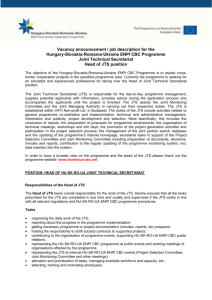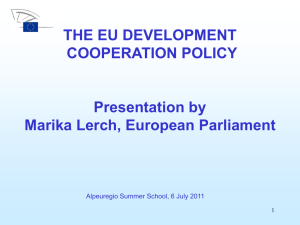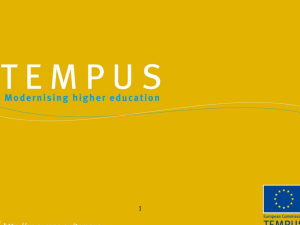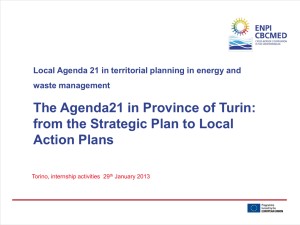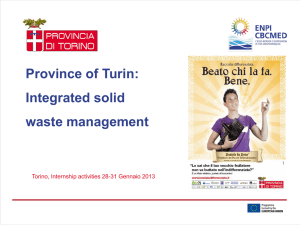Procurement: Overview and General rules
advertisement
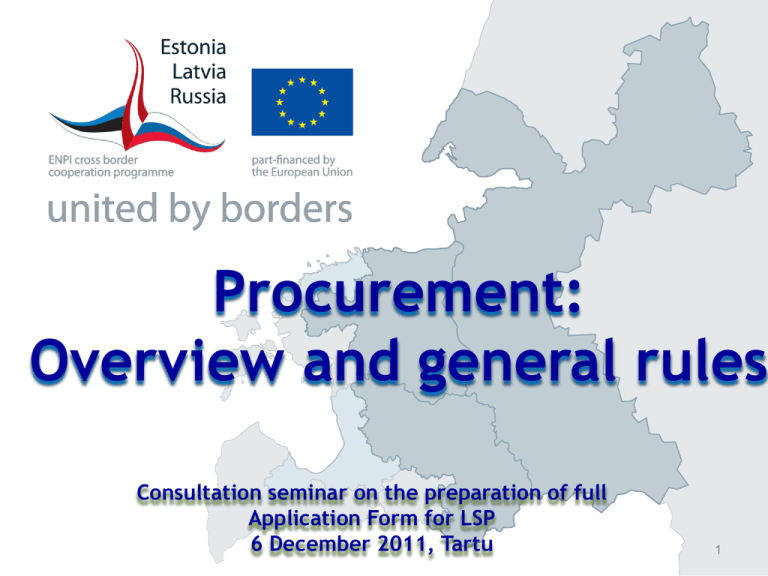
Procurement: Overview and general rules Consultation seminar on the preparation of full Application Form for LSP 6 December 2011, Tartu 1 Procurement in grants • Annex IV to be applied • For what is not described in the Annex IV (detailed procedures, tender documents): • Either Beneficiary’s national (own) rules, but must be in accordance with best international practice (meaning that it should not be contradictory to EU rules). • Or Chapters 3(Service), 4(Supply), 5(Works) of PRAG adjusted to Annex IV specific provisions *** Member states public entities simply use national procedures; except general principles (most economically advantageous), ENPI CBC rule of nationality and origin and grounds for exclusion 2 The nationality rule Annex IV: • Natural and legal persons • Open to all Member states + states allowed by Financial regulation (ENPI) ENPI Regulation (Art. 21): • Memeber states • ENPI, IPA, EEA countries • International organisations The detailed list in Annex A2 to PRAG (General Annexes) ”Eligibility – Programmes 2007-2013”, second section on ENPI 3 The nationality rule • Do not apply to the experts proposed by service providers taking part in tender procedures or service contracts financed by the grant • If implemented organisation: through International + natural or legal persons eligible pursuant to the rules of that organisation But: equal treatment to al donors to be ensured 4 The rule of origin Annex IV: • If the Regulation contains... ENPI Regulation (Art. 21): • Memeber states • ENPI, IPA, EEA countries • The detailed list in Annex A2 to PRAG (General Annexes) ”Eligibility – Programmes 2007-2013”, second section on ENPI ***If implemented through International organisation: + pursuant to the rules of that organisation But: equal treatment to all donors to be ensured 5 The rule of origin – “origin” Customs Code, Council Regulation 2913/1992, Art. 23 • Goods originating in a country shall be those wholly obtained or produced in that country • The expression ‘goods wholly obtained in a country’ means: • (a) mineral products extracted within that country; • (b) vegetable products harvested therein; • [...] • (j) goods which are produced therein exclusively from goods referred to in subparagraphs (a) to (i) or from their derivatives, at any stage of production 6 The rule of origin – “origin” Customs Code, Council Regulation 2913/1992, Art. 24 • Goods whose production involved more than one country shall be deemed to originate in the country where they underwent their last, substantial, economically justified processing or working in an undertaking equipped for that purpose and resulting in the manufacture of a new product or representing an important stage of manufacture 7 The rule of origin – certificate • The rule of origin applies to ALL supplies and materials (ENPI Regulation) The Certificate of origin: • Contractor must present to the Beneficiary for equipment and vehicles of a unit cost on purchase of more than € 5.000 • Made by the competent authorities of the country of origin In the Partner countries – Chambers of Commerce • Must comply with Community legislation Art. 12 of Customs Code and Arts. 47-62 of Implementing provisions Code’s Annex 12 (model EU certificate) 8 Nationality and origin: exceptions • By Derogation only (request to the Contracting authority) • Justifyed by: • Unavailability of products and services in the markets of the countries concerned • For reasons of extreme urgency • If the eligibility rule were to make the realisation of a project, a programme or an action impossible or exceedingly difficult • ***NOT if a product of ineligible origin is cheaper than the Community or local product 9 Rule of origin: exceptions Possibility of block derogation • For some equipment which constantly poses a problem of origin • After market research by JMA or several cases during implementation • Would apply to all the projects, but for a limited time (1 year indicatively) • Does not prevent the JMA from requesting some individual derogations also for the equipment that has not been identified in the block derogation • The time needed for such a block derogation should be taken into account not to hamper the projects’ implementation • Procurement plan would also help to identify the equipment for block derogation 10 The nationality and origin rule EU MSs ENPI countries: • Algeria, Armenia, Azerbaijan, Belarus, Egypt, Georgia, Israel, Jordan, Lebanon, Libya, Moldova, Morocco, Palestinian Authority of the West Bank and Gaza Strip, Russian Federation, Syria, Tunisia, Ukraine IPA countries: • Croatia, The former Yugoslav Republic of Macedonia, Turkey, Albania, Bosnia, Montenegro, Serbia, including Kosovo. EEA countries: • Iceland, Liechtenstein, Norway 11 Tender before contrat signature Art. 14 of General Conditions • Tender procedures may be initiated before the Grant is signed • However, the contract with the selected tenderer may be signed only when the Grant contract is concluded • Alternatively, the Beneficiary or partners conclude a contract with a suspensive clause may !!! All secondary procurement rules have to be respected • Thus, special attention should be put on informing all those Beneficiaries at the earliest possible stage. Further Information JOINT TECHNICAL SECRETARIAT Phone: +371 6750 9520 Fax: +371 6750 9523 E-mail: info@estlatrus.eu Ausekļa Street 14 – 3rd Floor, Riga, LV-1010, Latvia Thank You for attention! 14
